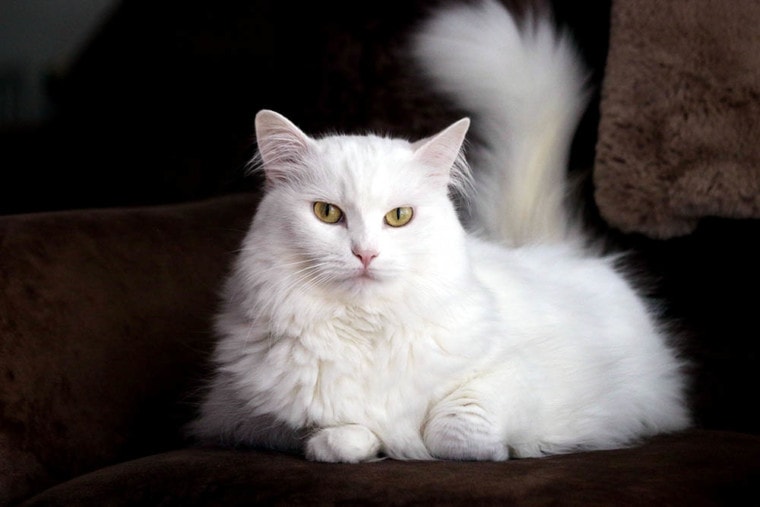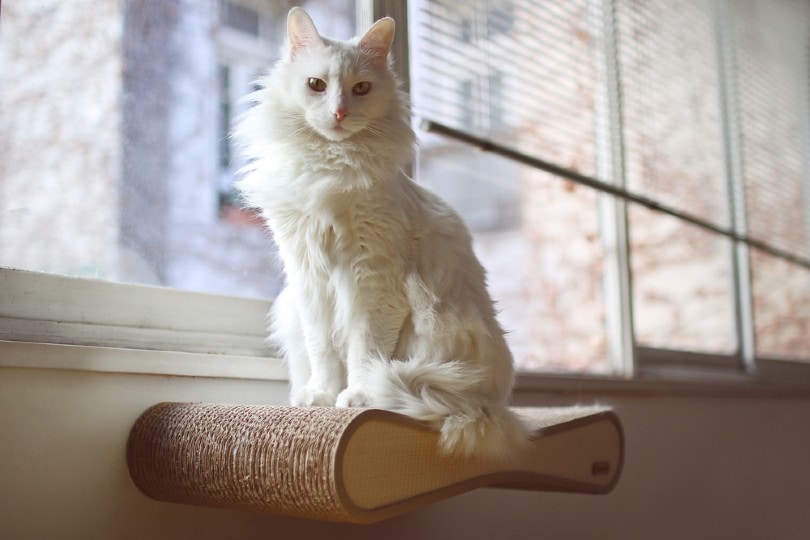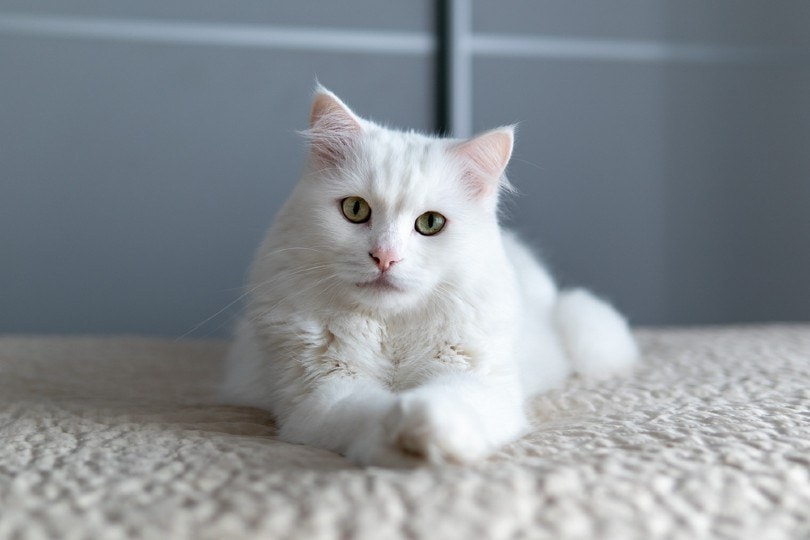
Click Below to Skip Ahead
If you are in love with long, silky coats and captivating eyes, then the Turkish Angora will get your heart pounding. This dainty breed knows what it wants and will demand your attention. Although they may think they’re in charge of your house, occupants, and other pets, they’ll get on marvelously with any person or animal they meet.
This interesting breed that often boasts a white coat and odd-colored eyes hail from Turkey. It is said to be Allah’s favorite type of cat, giving it much importance and value by Turkish people.
Once this breed was introduced in other countries, it was used to breed with the Persian cat.
Breed Overview
Height:
9–14 inches
Weight:
8–12 pounds
Lifespan:
15–18 years
Colors:
White, red, silver, cream, blue-cream, black, blue
Suitable for:
First-time cat owners, people who are active and can provide a lot of attention
Temperament:
Affectionate, playful, intelligent, loyal, easy to train, friendly
Unfortunately, through this process, the Angora almost reached extinction, and the Turkey government had to step in to protect the breed. Since then, the unique white Angora from Turkey, with different colored eyes, is now just about impossible to get your hands on. However, a few people have been successful.
White Angoras are now kept and maintained in a zoo in Ankara, Turkey, in an attempt to preserve them. However, you’ll see many other colored Angora roaming around the country freely.
Turkish Angora Characteristics
Turkish Angora Kittens
The price of a Turkish Angora kitten is going to vary between where you purchase your kitten and the age they are. You can adopt one of these cats from a shelter for a low price. Buying them from a breeder is going to push the price right up, although you’ll have greater surety about the cat you purchase.
If you’re looking for a Turkish Angora kitten from a breeder, expect to pay quite a high price. If you’re looking for a Turkish Angora kitten from a famous breeding farm that offers superior qualities and lineage, you may be paying even more.
Turkish Angora Temperament & Intelligence
Turkish Angoras are gorgeous cats that have both a wonderful temperament and a mind of their own. They’re incredibly intelligent, are easy to train, think they’re the boss, and like to resolve their own problems. They’re confident and secure in themselves and know what they want—and once they do, it’ll be a challenge to change their minds.
This beautiful breed is playful and wildly loyal. They’ll sit near you for hours on end and may even strike up a conversation, as they’re very vocal! They’re not scared to show affection through cuddling and will bond with “their human.” However, they’re not typically lap cats and don’t enjoy being held for long periods.
These cats love to explore, swim, and climb. If you’ve got a cat tree, they’ll be at the top of it in no time, on the lookout and enjoying their vantage point. Due to this independent quality, you will need to watch them when playing outside as they may wander off or find themselves stuck at the top of a tree.
Are Turkish Angoras Good for Families? 👪
These cats are excellent for families. Their high energy and playful spirits will keep your children entertained for hours. They don’t have too much interest in babies and toddlers because they’re unpredictable, but enjoy the company of slightly older children.
They have a knack for getting involved in activities or other tasks that you may be busy with because they love being a part of what’s happening around them.
However, due to their independent natures, they don’t solely rely on members of the household to keep them occupied and know how to find their own fun. Make sure to leave out several cat toys as they enjoy playing with a variety of options.
Their patient nature and low maintenance make Angora cats suitable for seniors, families with children, and single people.
Whether you’ve grown up with cats or you’re a first-time cat owner, the Turkish Angora is an excellent breed for families and will fit right in.
Do Turkish Angoras Get Along with Other Pets?
If you have dogs or other cats in the house, your Turkish Angora will let them know who’s in charge. But thanks to their social natures, they’ll usually get along well with them.
The best way to begin and ensure a healthy relationship between your pets is to introduce them properly. You can do this by getting them near to each other without being able to touch each other. A baby gate or crate will work. After a bit of time, when both pets look relaxed, lift the separation and let them sniff each other. Don’t leave them unsupervised until your pets are happy and relaxed around one another.
If you don’t have any other pets, that’s fine too. Angoras are independent and do well on their own as long as they get enough affection and attention from you.
Things to Know When Owning a Turkish Angora
Food & Diet Requirements 
Turkish Angora’s dainty bodies weren’t designed for heavy weight and should not be allowed to get overweight. Obese cats are also at risk for various health conditions, and to avoid such complications, it’s vital your Angora receives the right diet and stays away from carbohydrates as much as possible.
Your Angora is an obligate carnivore, which means they require protein in their diet. If they don’t receive enough protein, they’ll have fragile bones amongst many other health issues. They also need fats and all the essential nutrients found in animal protein. As long as your cat receives the proteins and fats they need in their cat food, you can give them high-quality dry kibble and add wet food on top.
This breed can be picky at times. They know what they like, and they won’t eat what they don’t. If you have any concerns about the food your cat is eating, it’s always best to chat to your vet and find out what type of cat food your specific cat would benefit most from.

Exercise 🐈
Once again, you don’t want your Turkish Angora to get overweight or obese, which means they require regular exercise. Thankfully, they are generally active enough to keep the weight off as they run, play, and climb.
To aid in exercise, get your cat tall cat trees to climb and toys to play with. Use feathers, lasers, toys on strings, and other devices for your cat to chase after. If you exercise your cat through play for 15 minutes, three times a day, the weight will stay off.
To add a bit more exercise to your cat’s day, you can try to take them on walks—just be sure to get a secure harness and allow your cat to ease into the new activity.
Training 🧶
Due to this breed’s high level of intelligence, they need to be trained. Not only will they thrive on the mental stimulation, but you’ll have a well-behaved cat who can respond to tricks and commands.
Make sure to train your cat when they’re in the mood for it, as this will keep their attention. The training sessions don’t have to be long, and you can start with litter box training which they will grasp very quickly. Remember to keep treats on hand so you can reward them for excellent behavior.
Grooming ✂️
Turkish Angoras are easy to groom because they only have a single-layer coat that is silky and fine. They won’t shed too much if you brush them two or three times a week. Make sure to clip their nails when they get too long and sharp and bath them only when necessary.

Health and Conditions 🏥
Thankfully, Turkish Angora cats don’t have too many health concerns. However, as with any cat, there are a few conditions to look out for.
Serious Conditions
Minor Conditions

3 Little-Known Facts About the Turkish Angora
1. Turkish Angora Cats Like Water
Bath time is often a nightmare when it comes to cats. Scratching and clawing to get away from the water is a routine experience. But surprisingly, Turkish Angoras like water and are great swimmers.
Who knows, you might even spot your Angora taking a swim in your pool on a hot summer’s day!
2. They’re Named After the City of Ankara
These beloved cats were named after the capital city of Turkey, their place of origin. You may be confused because this breed is called “Angora,” not “Ankara.” Ankara used to be called Angora, receiving the modern name in 1930.
Today, the Turkish Angora cat is often also referred to as the Ankara cat.
3. They Often Have Heterochromia Eyes
A fascinating and sought-after feature that many Turkish Angora cats possess is heterochromia eyes. This is a condition that results in the cat’s irises being of different colors. This condition is most common in Angoras that have white coats due to their white spotting gene.
Not only are their iris differences fascinating, but this breed also has a variety of beautiful eye shades. Turkish Angoras boast green, yellow, amber, and blue eyes.
Final Thoughts
If you’ve managed to get a Turkish Angora as a pet, count yourself very lucky as they’re wonderful pets to have, and they get on incredibly well with other animals. Their adventurous temperaments, affectionate personalities, and beautiful coats will add plenty of character to your family.
See also:
- Tiger Cat: Info, Pictures, Care & Characteristics
- Tonkinese Cat Breed: Temperament, Traits & Pictures
Featured Image Credit: TheCats, Shutterstock







